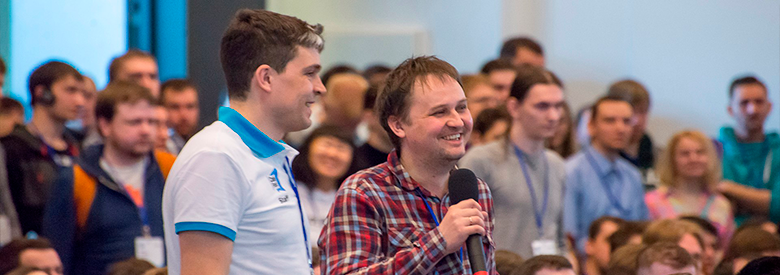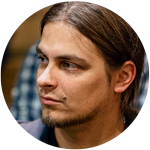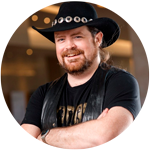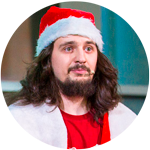Backend on CodeFest: bigdate, machine and blockchain
Management, testing and frontend behind, go to the backend - record section in the number of bumps.

Traditionally, we will talk about application architecture, microservices, infrastructure, databases and big data. We rush into machine learning and blockchain.
A total of 21 reports, three streams for two days, and for sweetness - an expert zone for two more streams and apartment residents.
')
Any working architecture should take into account that if an incident can occur, it will happen. Especially if you add high loads and constantly changing business requirements. Alexey Akulovich from VKontakte and Greg Foster will tell you how to work in such situations.
Dylan Beattie from Skills Matter and Robert Gubin from 2GIS will remind you of the importance of regular prevention of the code and caring attitude to those who then work with it.
Alexey Kirpichnikov from Kontur will share his experience in building a platform for creating and operating microservices, and Andrea Giunta will recommend approaches to building backends: SOA, REST, microservices or serverless, and maybe even a monolith. And Ivan Kruglov from Booking.com will tell about the transition from the monolith to the microservice system.
 Alexey from VKontakte on development under high load
Alexey from VKontakte on development under high load
“I will tell you how VC develops with the constant problems of software and iron, seasoned with high loads. How to write the code, how to conduct automated monitoring, about the approaches to the creation of functionality and a bit about the deployment. Many compromises and bicycles, everything as we love ”
 Dylan of Skills Matter
Dylan of Skills Matter
We’ll look at how you’ve worked with the paradigms. It would be a little bit more than that. on their face ?.
 Andrea from OrangeDev
Andrea from OrangeDev
Software architectures have something to do with them. This is where you talk about. It will focus on architectures.
Igor Yatsevich from 2GIS will tell you how to move the application from OpenStack to Kubernetes and not spill it on the way. Anna Shcherbinina will share her experience in using Docker containers using GPUs, and Valentin Bartenev will tell you about the possibilities of NGINX with the latest architecture.
 Igor from 2GIS will talk about transferring the application from OpenStack to Kubernetes
Igor from 2GIS will talk about transferring the application from OpenStack to Kubernetes
“I'll tell you why we switched from infrastructure in the form of OpenStack / Ansible to Kubernetes; how to make the dev, stage and production environments as close as possible; about the features of the Kubernetes manifest configuration for a PHP application; how to check the performance in Kubernetes; about problems and how they were solved "
 Anna from Artec3D on the experience of using Docker containers using GPU
Anna from Artec3D on the experience of using Docker containers using GPU
“Although we are not miners, the most useful articles for us were“ do-it-yourself farm ”, as it is very similar in architecture. GPU, Docker, Scaling. What finally happened, what was abandoned and how many cones were filled. ”
 Valentin from NGNIX Inc on NGINX features
Valentin from NGNIX Inc on NGINX features
“I'll tell you why a new server was created, its main advantages, capabilities, and what tasks it can handle. I will get acquainted with its architecture and, if there is time, with a convenient JSON RESTful management interface that allows you to quickly manipulate web applications without losing connections and interruptions in service. ”
In the topic of databases let's talk about sharding - it would seem, everything has already been said, but no. Let's get inspired by PostgreSQL 10 updates. Meet two CodeFest old-timers: Konstantin Osipov from Mail.ru and Ivan Panchenko from Postgres Professional.
 Konstantin from Mail.ru about architecture in SQL and NoSQL systems
Konstantin from Mail.ru about architecture in SQL and NoSQL systems
“I will compare the architecture and technical solutions in modern SQL and NoSQL systems: Couchbase, MongoDB, Cassandra, CockroachDB and, of course, Tarantool. How is the data broken? Where is information about the distribution of data and their location? Is there a dedicated software component for routing requests, or is the routing done by the storage nodes themselves? ”
 Ivan from Postgres Professional
Ivan from Postgres Professional
“In PostgreSQL 10.0, logical replication appeared in addition to the usual stream replication. It can go in several directions, which allows you to build cluster configurations with several wizards. Logical replication can be used between nodes of different versions, so you can organize a smooth, almost seamless server upgrade. ”
Three themes with the greatest level of noise around him.
Pavel Dimitryuk from Beeline will talk about the experience of storing and processing streaming data generated by a huge number of base stations. How to be in the subject and to call things with their own names will teach Alexey Natekin, the organizer of the Russian-speaking community, Open Data Science. And about the latest achievements in the search for products from the photo on Avito, Arthur Kuzin will tell. Nikita Baksalyar from MaidSafe will tell you why the blockchain is more than the release of tokens for speculation on the exchange. And Svetlana Rusova from SmartContracts.Engineer will talk about smart contracts.
 Alexey from Open Data Science on terms and names
Alexey from Open Data Science on terms and names
“We often hear about the successes of not that Data Science with Machine Learning, not the AI, or even Big Data. But what is this, anyway? Are these things somehow related? Let's try to figure out what's going on. ”
⠀
⠀
 Nikita from MaidSafe about the blockchain
Nikita from MaidSafe about the blockchain
“In this report, we will not talk about trading, tokens, ICO and other topics that have smashed teeth. Instead, we will look at Ethereum and analogs through the eyes of developers and learn how to use the blockchain to develop decentralized applications and what advantages decentralized networks have over classical backends and servers. ”
Any managed environment needs to be used with skill, otherwise problems will reduce joy to nothing. No exception and the .NET platform with its automatic memory management. And what about the launch of .NET applications on ARM devices, for example, Raspberry PI?
How to collect and process data from sensors connected to the Raspberry PI will tell our permanent speaker Raffaele Rivaldi from Vevy Europe. And the peculiarities of working with the garbage collector will be told by Mikhail Yariichuk from Hibernating Rhinos.
 Raffaele from Vevy Europe
Raffaele from Vevy Europe
During the session, the Raspberry PI offers. In this case you can run both on Windows and the PI.
 Michael from Hibernating Rhinos about the garbage collector
Michael from Hibernating Rhinos about the garbage collector
“The .Net garbage collector is a great thing. It helps to write code faster, without being distracted by memory management. But sometimes garbage collection causes the program to hang for a long time - up to an absurd 90% of the execution time. I will talk about the garbage collector in .Net, how it affects performance and how to reduce the number of sags and increase the speed of the programs. ”
And more about the important thing - the evening of the first day is planned after-party, and a program was added to the site. Rate the swing!

What is the backend section
Traditionally, we will talk about application architecture, microservices, infrastructure, databases and big data. We rush into machine learning and blockchain.
A total of 21 reports, three streams for two days, and for sweetness - an expert zone for two more streams and apartment residents.
')
Pro architecture
Any working architecture should take into account that if an incident can occur, it will happen. Especially if you add high loads and constantly changing business requirements. Alexey Akulovich from VKontakte and Greg Foster will tell you how to work in such situations.
Dylan Beattie from Skills Matter and Robert Gubin from 2GIS will remind you of the importance of regular prevention of the code and caring attitude to those who then work with it.
Alexey Kirpichnikov from Kontur will share his experience in building a platform for creating and operating microservices, and Andrea Giunta will recommend approaches to building backends: SOA, REST, microservices or serverless, and maybe even a monolith. And Ivan Kruglov from Booking.com will tell about the transition from the monolith to the microservice system.
 Alexey from VKontakte on development under high load
Alexey from VKontakte on development under high load“I will tell you how VC develops with the constant problems of software and iron, seasoned with high loads. How to write the code, how to conduct automated monitoring, about the approaches to the creation of functionality and a bit about the deployment. Many compromises and bicycles, everything as we love ”
 Dylan of Skills Matter
Dylan of Skills MatterWe’ll look at how you’ve worked with the paradigms. It would be a little bit more than that. on their face ?.
 Andrea from OrangeDev
Andrea from OrangeDevSoftware architectures have something to do with them. This is where you talk about. It will focus on architectures.
About infrastructure
Igor Yatsevich from 2GIS will tell you how to move the application from OpenStack to Kubernetes and not spill it on the way. Anna Shcherbinina will share her experience in using Docker containers using GPUs, and Valentin Bartenev will tell you about the possibilities of NGINX with the latest architecture.
 Igor from 2GIS will talk about transferring the application from OpenStack to Kubernetes
Igor from 2GIS will talk about transferring the application from OpenStack to Kubernetes“I'll tell you why we switched from infrastructure in the form of OpenStack / Ansible to Kubernetes; how to make the dev, stage and production environments as close as possible; about the features of the Kubernetes manifest configuration for a PHP application; how to check the performance in Kubernetes; about problems and how they were solved "
 Anna from Artec3D on the experience of using Docker containers using GPU
Anna from Artec3D on the experience of using Docker containers using GPU“Although we are not miners, the most useful articles for us were“ do-it-yourself farm ”, as it is very similar in architecture. GPU, Docker, Scaling. What finally happened, what was abandoned and how many cones were filled. ”
 Valentin from NGNIX Inc on NGINX features
Valentin from NGNIX Inc on NGINX features“I'll tell you why a new server was created, its main advantages, capabilities, and what tasks it can handle. I will get acquainted with its architecture and, if there is time, with a convenient JSON RESTful management interface that allows you to quickly manipulate web applications without losing connections and interruptions in service. ”
About databases
In the topic of databases let's talk about sharding - it would seem, everything has already been said, but no. Let's get inspired by PostgreSQL 10 updates. Meet two CodeFest old-timers: Konstantin Osipov from Mail.ru and Ivan Panchenko from Postgres Professional.
 Konstantin from Mail.ru about architecture in SQL and NoSQL systems
Konstantin from Mail.ru about architecture in SQL and NoSQL systems“I will compare the architecture and technical solutions in modern SQL and NoSQL systems: Couchbase, MongoDB, Cassandra, CockroachDB and, of course, Tarantool. How is the data broken? Where is information about the distribution of data and their location? Is there a dedicated software component for routing requests, or is the routing done by the storage nodes themselves? ”
 Ivan from Postgres Professional
Ivan from Postgres Professional“In PostgreSQL 10.0, logical replication appeared in addition to the usual stream replication. It can go in several directions, which allows you to build cluster configurations with several wizards. Logical replication can be used between nodes of different versions, so you can organize a smooth, almost seamless server upgrade. ”
About big data, engineered and blockchain
Three themes with the greatest level of noise around him.
Pavel Dimitryuk from Beeline will talk about the experience of storing and processing streaming data generated by a huge number of base stations. How to be in the subject and to call things with their own names will teach Alexey Natekin, the organizer of the Russian-speaking community, Open Data Science. And about the latest achievements in the search for products from the photo on Avito, Arthur Kuzin will tell. Nikita Baksalyar from MaidSafe will tell you why the blockchain is more than the release of tokens for speculation on the exchange. And Svetlana Rusova from SmartContracts.Engineer will talk about smart contracts.
 Alexey from Open Data Science on terms and names
Alexey from Open Data Science on terms and names“We often hear about the successes of not that Data Science with Machine Learning, not the AI, or even Big Data. But what is this, anyway? Are these things somehow related? Let's try to figure out what's going on. ”
⠀
⠀
 Nikita from MaidSafe about the blockchain
Nikita from MaidSafe about the blockchain“In this report, we will not talk about trading, tokens, ICO and other topics that have smashed teeth. Instead, we will look at Ethereum and analogs through the eyes of developers and learn how to use the blockchain to develop decentralized applications and what advantages decentralized networks have over classical backends and servers. ”
Bit hardcore
Any managed environment needs to be used with skill, otherwise problems will reduce joy to nothing. No exception and the .NET platform with its automatic memory management. And what about the launch of .NET applications on ARM devices, for example, Raspberry PI?
How to collect and process data from sensors connected to the Raspberry PI will tell our permanent speaker Raffaele Rivaldi from Vevy Europe. And the peculiarities of working with the garbage collector will be told by Mikhail Yariichuk from Hibernating Rhinos.
 Raffaele from Vevy Europe
Raffaele from Vevy EuropeDuring the session, the Raspberry PI offers. In this case you can run both on Windows and the PI.
 Michael from Hibernating Rhinos about the garbage collector
Michael from Hibernating Rhinos about the garbage collector“The .Net garbage collector is a great thing. It helps to write code faster, without being distracted by memory management. But sometimes garbage collection causes the program to hang for a long time - up to an absurd 90% of the execution time. I will talk about the garbage collector in .Net, how it affects performance and how to reduce the number of sags and increase the speed of the programs. ”
And more about the important thing - the evening of the first day is planned after-party, and a program was added to the site. Rate the swing!
Source: https://habr.com/ru/post/350570/
All Articles